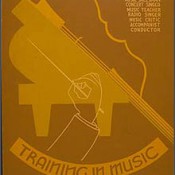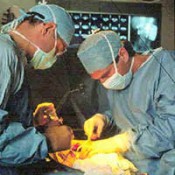
For some adult students, the love of music creates a paralysis of learning that is remarkable and surprising. We always assume that the love of a subject is an important ingredient in learning; but too much can get in the way. For some, music is so precious and wonderful that their awe of it makes it hard to approach the nitty-gritty work necessary for mastery of the common physical tasks of music making. Most everyone seems to experience some degree of this.
In The Baggage Fossils Bring to Their Lessons I talked about music having an aura of magic. It’s as if one has to be mysteriously “anointed” to play. Otherwise, it’s presumptuous. It seems one must possess a unique talent; to have a certain kind of hand or finger; to have an “artistic” temperament. It’s as though playing classical music is not an activity for normal people.
Given that music can excite the emotions to such a deep level, this is probably not surprising. The intensity of emotions listening to music is truly awesome. These emotions can overtake our minds and bodies as few things can. It does feel special and, at times, even otherworldly.
Not only that, these intense emotions are very private. Nobody knows what we feel when we listen to a piece of music. In a world that frowns on excessive emotions, music can be a safe haven to experience a flood of feelings about which no one knows. People can’t see them. It’s not like turning red when you’re embarrassed or shaky when you’re scared. People can tell then. The emotions of music are safe and all invisible.
All this skews our understanding of the work of music. It is a unique complication of the adult learning experience, for when children start lessons, they don’t really grasp how special music is. They don’t begin their music study with all the intense emotional experiences of listening. Piano lessons are just part of that huge work of childhood called education. They just learn to read the notes, feel the rhythm and play as fast as possible.
We forget that music making is a natural human endeavor and most people can do it very well if they want to put their minds to it. It’s like speaking; we can all do it. It’s true, there are some very special speakers who can mesmerize an audience with the quality of their voice, their choice of words, their gestures and demeanor. Yet most of us can do an adequate job of expressing what we feel. We need some basic skills that take time to acquire, but beyond that, it’s not so special.
There is a work–like quality to music making that gets lost in all the magic and mystery of our listening experiences. The work of music is nothing special, nothing magical, and nothing particularly expressive. It’s called practicing. There are times that it goes really well and special moments happen, but usually not. Practicing is a humdrum affair like so much of life.
Another Learning Model
 Music and medicine have been paired since time immemorial. I was surprised to find another pairing quite useful. The New Yorker magazine carried an article by Atul Gawande called the The Learning Curve in the January 26, 2002 issue.
Music and medicine have been paired since time immemorial. I was surprised to find another pairing quite useful. The New Yorker magazine carried an article by Atul Gawande called the The Learning Curve in the January 26, 2002 issue.
The article was about surgeons’ need to practice their procedures. When amateur musicians perform they are so scared they feel like they’re involved with a life and death struggle. Surgeons, on the other hand, actually are. In spite of this, their training appears to be very matter of fact. The article mentioned none of the specialness and preciousness we associate with music training; quite the contrary. In its own way, this article is more truthful about becoming a good musician (amateur or otherwise) then one usually encounters in musical circles.
Surgeons, as a group, adhere to a curious egalitarianism. They believe in practice, not talent. People often assume that you have to have great hands to become a surgeon, but it’s not true. When I interviewed to get into surgery programs, no one made me sew or take a dexterity test or checked to see if my hands were steady… To be sure, talent helps. Professors say that every two or three years they’ll see someone truly gifted come through a program-someone who picks up complex manual skill unusually quickly. Nonetheless, attending surgeons say that what’s most important to them is finding people who are conscientious, industrious and boneheaded enough to keep on practicing this one difficult thing day and night for years on end. Skill, surgeons believe, can be taught; tenacity cannot.
And it works. There have now been many studies of elite performers–concert violinists, chess grand masters, professional ice-skaters, mathematicians, and so forth-and the biggest difference researchers find…is the amount of deliberate practice they’ve accumulated. Indeed, the most important talent may be the talent for practice itself.
Writes Dr. Gawande of himself:
I am, I have found, neither gifted nor maladroit. With practice and more practice, I get the hang of it.
I suspect he speaks as most piano students.
It’s not that there’s no mystery. There is in both practices. Dr. Gawande could be writing about piano practice when he writes, “I still have no idea what I did differently that day… That’s the funny thing about practice. For days and days, you make out only the fragments of what to do. And then one day you’ve got the thing whole. Conscious learning becomes unconscious knowledge, and you cannot say precisely how.”
Like musical training, “Surgical training is…this process–floundering, followed by fragments, followed by knowledge and, occasionally, a moment of elegance-over and over again, for ever harder tasks with ever greater risks.”
Unlike surgery, playing a musical instrument is a wonderful avocation. But at whatever level of involvement, the basic understanding of work is necessary. The work of practice must be consistent though it need not be long. Undeniably, longer quality practice produces faster results. This work has substantial stretches of drudgery and ordinariness that are unavoidable. The more one can accept this fact of practice, the easier it is to practice and the more rewarding the practice experience becomes.
It is this experience of discipline from which the moments of elegance, beauty, and excitement emerge. It is this work that is the well-spring of our joy in playing for ourselves, our pleasure in sharing our music with others, and the confidence to engage in the trials of performance.
